Experience of offline / online courses in Ruby on Rails with mandatory RE
How to make students in programming courses not only present, but to get real results in the process and at the output?
The article tells about our experience in organizing courses, thanks to which we managed to achieve quite good results for both participants and organizers.
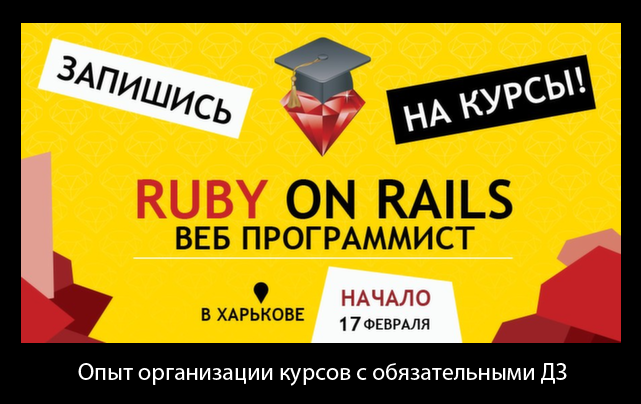
In Kharkov, and indeed in our area, alas, there are few rubists, even for our small Ruby on Rails company of 20 people. Many companies open free courses, after which they select for themselves the best graduates. Unfortunately, a substantial part of the selected students very quickly begin to ignore not only homework, but also the classes themselves. Therefore, it is important to get initially motivated candidates for Ruby on Rails developers. Nothing motivates and confirms the readiness to learn, as the participation paid for with their blood.
In addition to the actual Ruby and Rails courses, we set the goal of giving people, in theory and practice, gain basic skills in working with the git repository, team work, and the basics of working with Linux systems based on Ubuntu.
')
Prior to that, about 90% of the employees we had had an internship at Ruby, during which we received a learning experience from scratch to the beginner junior developer. This experience and many years of work on commercial projects gave an understanding of what newcomers need for a confident start.
The courses decided to call Ruby Bursa, since on the one hand all the other teaching words like “school”, “academy”, “university” were occupied. On the other hand, I wanted to call it somehow “our way”. Bursa - the name of vocational school in Ukraine and in the southern part of Russia (slang).
It should be added that in the view of many non-IT specialists, a quick start to our web sphere, as it seems to them, of the honeymoon, goes through pure PHP. We gave the opportunity to start courses on Ruby on Rails.
It is worth noting that many of the others were outraged by the fact that the idea of “paid courses” itself was motivated by the fact that they say, “others do it for free, why do you have fun?”. I have a firm belief that the honest work of organizing and conducting courses must be honestly paid. Free is not good?
What goals did we set for ourselves? Is it possible for two months from an unprepared person to make an excellent programmer? We think that most likely not. We tried to create a rigid system, hitting which each participant would be forced to either reach the end or fly out with noise (we returned the money at the first request). And judging by the feedback and the results of the students, we did it.
The key difference from all other courses, including driving courses, English, was a strict requirement for homework. After the first deadline, a yellow card was publicly exposed to the participant. After the second - “this is a hack, a private” and a red card. One student even called our system "study like in Europe." If you look soberly at this approach, then it is extremely advantageous for everyone. Those who fly out, as a rule, in fact do not lose anything. As usually, if a person stops doing homework, he rarely catches up with the group and almost always stops learning. At the same time, a loud emphasis on public exclusion makes an excellent shake-up for other participants in the process.
An additional motivation was the rating of students. The balls were influenced by speed. the timeliness and correctness of the practical tasks, as well as the results of tests on the passed materials. Almost all course participants admitted that they often had to finish their tasks at night without getting enough sleep. But no one was dissatisfied with the situation. Everyone understood that "if you don’t push a bird, it will not fly."
According to the plan they decided to make the first month dedicated to Ruby, the second - Rails. Who is interested in the actual program, it is posted on the site .
We made the website of the courses in a one - page style, where we tried to explain in detail what to expect from the courses, a detailed program, feedback from our interns from the company, and even Ruby on Rails promo.
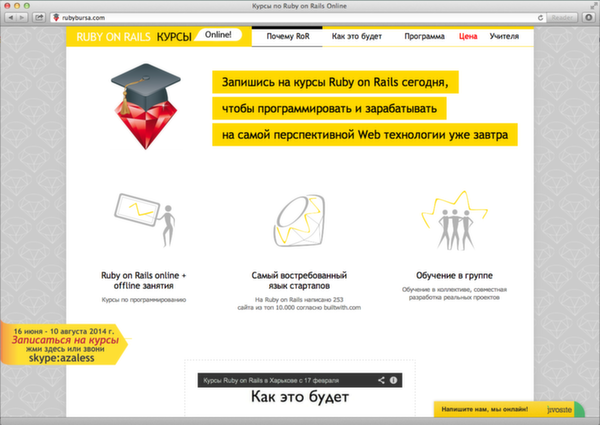
During the two years of active participation in the job fairs, we gathered about 900 contacts, for which we sent out newsletters about the courses. Additionally, promoting courses through the IT community of Kharkov, sites about work and just social networks.
Of the 42 participants, 5 interns of our company also participated in the courses. In the first classes, they helped with the “everyday” and “childish” problems that all beginners in Ruby on Rails face.
The audience that came to the courses can be divided into several parts:
1) The so-called "switches" from other languages. They say, "how many languages do you know, so many times you are a man." I think it can be argued similarly that "how many programming languages you know - so many times you are a programmer." Knowledge of several languages, frameworks, approaches to development helps to think more widely and use the best IT tools. For obvious reasons, this category was the strongest. After a month of study it is worth noting that not all graduates immediately retrained on Rails developers.
2) Testers who needed Ruby as a server-side scripting language. These were mostly girls who deliberately did not reach the second month of the dedicated Rails framework.
3) Companies sent their employees to learn a second or N-th language. Probably for a bonus
4) Newbies in commercial programming, which made up about a quarter of all participants. For obvious reasons, this category had a hard time. Previously, these students, as a rule, had already studied programming in schools and universities. But it was thanks to the “shock therapy” that they completed 7 laps of RoR and at the exit they were ready for the start in IT
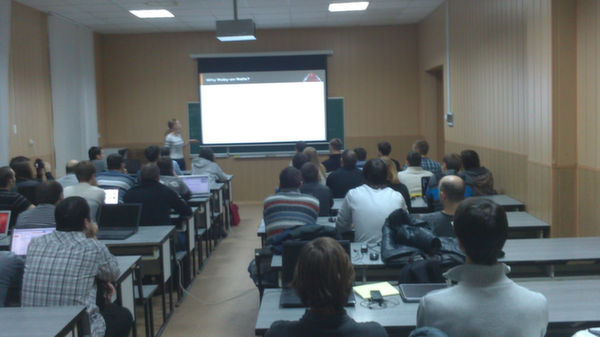
Of the unusual students worth noting Dmitry Krivosheev, the owner of the network of English language courses from 9 departments in the city. To the surprise of the organizers, he also successfully reached the end. The motivation for passing the courses turned out to be the desire to write their own social network system for learning foreign languages on Ruby on Rails.
We decided to make courses as an experiment in online and offline format. On Thursdays there were full three-hour classes from 19: 00-22: 00. On Mondays, studies took place in the online format from 21: 00-22: 30. Within one and a half hours in the format of a webinar, the information was presented mostly theoretical. One of the advantages of such a system is:
1) many students on Mondays / Wednesdays / Fridays in the evenings attend English, dance or sports courses
2) some participants spent on transport for an hour. Once a week this could have been avoided.
3) In the online mode, it was possible to more closely consider the presentation than on the projector. The recordings of these lessons were done automatically and did not require an operator.
The opening week was exceptionally live, in order to get to know each other better and to give the audience confidence that they will succeed. At the first lesson, instead of the theory on the standard tutorial, participants created a blog on the laptops of the participants and uploaded it to the free Rails hosting heroku.
Further, despite the turbulent situation in the country in February and April, the courses went according to plan.
The second month began the study of the Rails framework with a gradual transition to group work on training projects.
A small but pleasant joy for the participants turned out to be coffee breaks in between classes.
Instead of the exam, we decided to arrange a surprise. At first they invited our Senior developer, who interviewed one of the brave cadets in front of everyone, to show what was waiting for the listeners at the interviews.
After that they announced that instead of the exam there will be a celebration of the completion of the course.
At the unexpected graduation, all who reached the successful end received certificates.

37 out of 42 participants successfully completed the course.
Instrumentally, we did not invent a bicycle and create a special application.
As tools used:
1) For online classes in the format of Webinar - Wiziq . At the time of the course, he provided 30 days of free unlimited use. It was impossible to fumble the teacher’s desktop, but he did an excellent job with the main tasks of online presentations and communication in the chat.
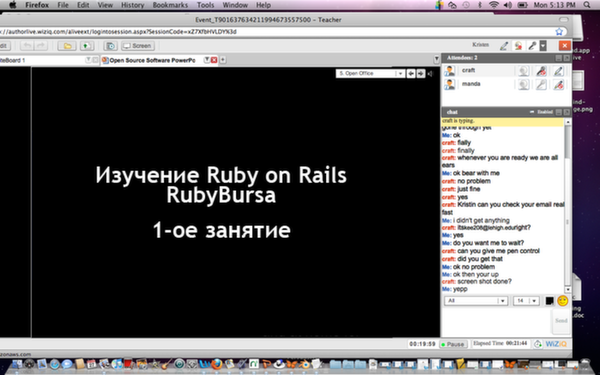
In the following courses, we plan to use Citrix Gotowebinar, which, among other things, will allow the teacher’s desktop to be successfully transmitted, and if necessary, the tables of the course participants.
2) For homework, publication of records of past assignments and communication between the participants of the course we were perfectly approached by the free service Piazza . We plan to use it in the next course.
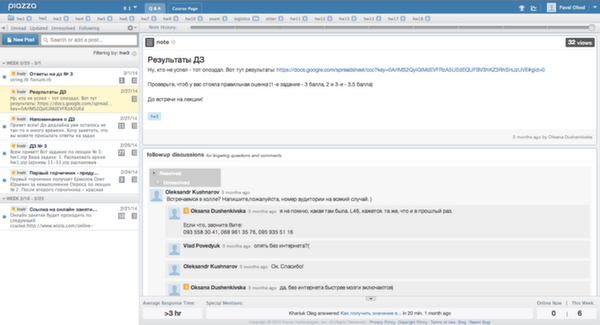
3) For a good calculation of the rating, they used the good old google.
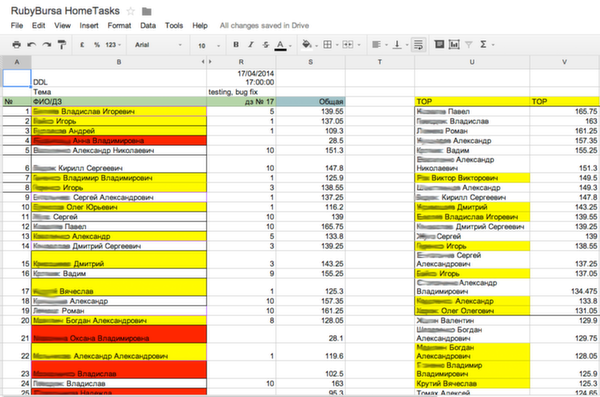
Reviewed by the participant Pavel Kovalev - the leader of the rating:
https://medium.com/@mr_kovalyov/4f1303dbf1dd
The best participants according to the rating were presented with books on Ruby on Rails:

Findings:
1) Online + Offline system was successful. Such an approach without modesty was appreciated by both the students and the teacher. Periodic live chat was supported by weekly online broadcasts.
2) Card systems with warnings and exceptions, as well as rating systems were excellent motivators. Despite the sleepless nights, the students zealously nibbled on the granite of RonR science.
3) The commercial training system for our company has justified itself from the position of personnel. After completing the courses, our company took two developers on board, and several are currently negotiating. 5 interns received systematized knowledge and skills training, which is so difficult to organize in a small company due to the operational routine and employment of experienced developers.
Additionally:
Many visitors to our site from Dnepropetrovsk, Odessa, Novosibirsk and other cities asked about the possibility of participating in courses remotely.
Therefore, from June 16, we decided to start the first purely online Ruby on Rails training course: http://rubybursa.com . Pre-registration takes place until June 12. Occupation time 21: 30-23: 00 GMT. Days monday and thursday.
The article tells about our experience in organizing courses, thanks to which we managed to achieve quite good results for both participants and organizers.

In Kharkov, and indeed in our area, alas, there are few rubists, even for our small Ruby on Rails company of 20 people. Many companies open free courses, after which they select for themselves the best graduates. Unfortunately, a substantial part of the selected students very quickly begin to ignore not only homework, but also the classes themselves. Therefore, it is important to get initially motivated candidates for Ruby on Rails developers. Nothing motivates and confirms the readiness to learn, as the participation paid for with their blood.
In addition to the actual Ruby and Rails courses, we set the goal of giving people, in theory and practice, gain basic skills in working with the git repository, team work, and the basics of working with Linux systems based on Ubuntu.
')
Prior to that, about 90% of the employees we had had an internship at Ruby, during which we received a learning experience from scratch to the beginner junior developer. This experience and many years of work on commercial projects gave an understanding of what newcomers need for a confident start.
The courses decided to call Ruby Bursa, since on the one hand all the other teaching words like “school”, “academy”, “university” were occupied. On the other hand, I wanted to call it somehow “our way”. Bursa - the name of vocational school in Ukraine and in the southern part of Russia (slang).
It should be added that in the view of many non-IT specialists, a quick start to our web sphere, as it seems to them, of the honeymoon, goes through pure PHP. We gave the opportunity to start courses on Ruby on Rails.
It is worth noting that many of the others were outraged by the fact that the idea of “paid courses” itself was motivated by the fact that they say, “others do it for free, why do you have fun?”. I have a firm belief that the honest work of organizing and conducting courses must be honestly paid. Free is not good?
What goals did we set for ourselves? Is it possible for two months from an unprepared person to make an excellent programmer? We think that most likely not. We tried to create a rigid system, hitting which each participant would be forced to either reach the end or fly out with noise (we returned the money at the first request). And judging by the feedback and the results of the students, we did it.
The key difference from all other courses, including driving courses, English, was a strict requirement for homework. After the first deadline, a yellow card was publicly exposed to the participant. After the second - “this is a hack, a private” and a red card. One student even called our system "study like in Europe." If you look soberly at this approach, then it is extremely advantageous for everyone. Those who fly out, as a rule, in fact do not lose anything. As usually, if a person stops doing homework, he rarely catches up with the group and almost always stops learning. At the same time, a loud emphasis on public exclusion makes an excellent shake-up for other participants in the process.
An additional motivation was the rating of students. The balls were influenced by speed. the timeliness and correctness of the practical tasks, as well as the results of tests on the passed materials. Almost all course participants admitted that they often had to finish their tasks at night without getting enough sleep. But no one was dissatisfied with the situation. Everyone understood that "if you don’t push a bird, it will not fly."
According to the plan they decided to make the first month dedicated to Ruby, the second - Rails. Who is interested in the actual program, it is posted on the site .
We made the website of the courses in a one - page style, where we tried to explain in detail what to expect from the courses, a detailed program, feedback from our interns from the company, and even Ruby on Rails promo.

During the two years of active participation in the job fairs, we gathered about 900 contacts, for which we sent out newsletters about the courses. Additionally, promoting courses through the IT community of Kharkov, sites about work and just social networks.
Of the 42 participants, 5 interns of our company also participated in the courses. In the first classes, they helped with the “everyday” and “childish” problems that all beginners in Ruby on Rails face.
The audience that came to the courses can be divided into several parts:
1) The so-called "switches" from other languages. They say, "how many languages do you know, so many times you are a man." I think it can be argued similarly that "how many programming languages you know - so many times you are a programmer." Knowledge of several languages, frameworks, approaches to development helps to think more widely and use the best IT tools. For obvious reasons, this category was the strongest. After a month of study it is worth noting that not all graduates immediately retrained on Rails developers.
2) Testers who needed Ruby as a server-side scripting language. These were mostly girls who deliberately did not reach the second month of the dedicated Rails framework.
3) Companies sent their employees to learn a second or N-th language. Probably for a bonus
4) Newbies in commercial programming, which made up about a quarter of all participants. For obvious reasons, this category had a hard time. Previously, these students, as a rule, had already studied programming in schools and universities. But it was thanks to the “shock therapy” that they completed 7 laps of RoR and at the exit they were ready for the start in IT

Of the unusual students worth noting Dmitry Krivosheev, the owner of the network of English language courses from 9 departments in the city. To the surprise of the organizers, he also successfully reached the end. The motivation for passing the courses turned out to be the desire to write their own social network system for learning foreign languages on Ruby on Rails.
We decided to make courses as an experiment in online and offline format. On Thursdays there were full three-hour classes from 19: 00-22: 00. On Mondays, studies took place in the online format from 21: 00-22: 30. Within one and a half hours in the format of a webinar, the information was presented mostly theoretical. One of the advantages of such a system is:
1) many students on Mondays / Wednesdays / Fridays in the evenings attend English, dance or sports courses
2) some participants spent on transport for an hour. Once a week this could have been avoided.
3) In the online mode, it was possible to more closely consider the presentation than on the projector. The recordings of these lessons were done automatically and did not require an operator.
The opening week was exceptionally live, in order to get to know each other better and to give the audience confidence that they will succeed. At the first lesson, instead of the theory on the standard tutorial, participants created a blog on the laptops of the participants and uploaded it to the free Rails hosting heroku.
Further, despite the turbulent situation in the country in February and April, the courses went according to plan.
The second month began the study of the Rails framework with a gradual transition to group work on training projects.
A small but pleasant joy for the participants turned out to be coffee breaks in between classes.
Instead of the exam, we decided to arrange a surprise. At first they invited our Senior developer, who interviewed one of the brave cadets in front of everyone, to show what was waiting for the listeners at the interviews.
After that they announced that instead of the exam there will be a celebration of the completion of the course.
At the unexpected graduation, all who reached the successful end received certificates.

37 out of 42 participants successfully completed the course.
Instrumentally, we did not invent a bicycle and create a special application.
As tools used:
1) For online classes in the format of Webinar - Wiziq . At the time of the course, he provided 30 days of free unlimited use. It was impossible to fumble the teacher’s desktop, but he did an excellent job with the main tasks of online presentations and communication in the chat.

In the following courses, we plan to use Citrix Gotowebinar, which, among other things, will allow the teacher’s desktop to be successfully transmitted, and if necessary, the tables of the course participants.
2) For homework, publication of records of past assignments and communication between the participants of the course we were perfectly approached by the free service Piazza . We plan to use it in the next course.

3) For a good calculation of the rating, they used the good old google.

Reviewed by the participant Pavel Kovalev - the leader of the rating:
https://medium.com/@mr_kovalyov/4f1303dbf1dd
The best participants according to the rating were presented with books on Ruby on Rails:

Findings:
1) Online + Offline system was successful. Such an approach without modesty was appreciated by both the students and the teacher. Periodic live chat was supported by weekly online broadcasts.
2) Card systems with warnings and exceptions, as well as rating systems were excellent motivators. Despite the sleepless nights, the students zealously nibbled on the granite of RonR science.
3) The commercial training system for our company has justified itself from the position of personnel. After completing the courses, our company took two developers on board, and several are currently negotiating. 5 interns received systematized knowledge and skills training, which is so difficult to organize in a small company due to the operational routine and employment of experienced developers.
Additionally:
Many visitors to our site from Dnepropetrovsk, Odessa, Novosibirsk and other cities asked about the possibility of participating in courses remotely.
Therefore, from June 16, we decided to start the first purely online Ruby on Rails training course: http://rubybursa.com . Pre-registration takes place until June 12. Occupation time 21: 30-23: 00 GMT. Days monday and thursday.
Source: https://habr.com/ru/post/224975/
All Articles